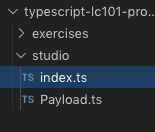28.8. Studio: TypeScript¶
Let's practice TypeScript by creating classes for rocket cargo calculations.
28.8.1. Starter Code¶
If you have not already done so, follow the instructions given in the TypeScript exercises to fork the GitHub repository.
Use the terminal to check that you are in the master branch, then navigate
into the studio folder.
$ git branch
* master
solutions
$ pwd
/typescript-lc101-projects
$ ls
exercises studio
$ cd studio
$ ls
index.ts Payload.ts
From the file tree in VSCode, open the index.ts file.

28.8.2. Requirements¶
Create classes for
Astronaut,Cargo, andRocket. (Details below).All classes should be defined in their own files.
Use the new classes to run a simulation in the
index.tsfile.
In the starter code, you will notice that an interface named Payload has
been declared. This interface ensures that any class that implements it will
have a massKg property.
28.8.3. Classes¶
Create three new files---
Astronaut.ts,Cargo.ts, andRocket.ts. To do this in VSCode, click the "New File" button and enter the file name. Another option is to run the commandtouch new_file_namein the terminal.
Define each class (
Astronaut,Cargo,Rocket) in a separate file. Each class should be exported usingexport.export class Astronaut { // properties and methods }
As needed, the classes can be imported using
import.import { Astronaut } from './Astronaut';
28.8.3.1. Astronaut Class¶
Defined in
Astronaut.tsImplements the
PayloadinterfaceProperties
massKgshould be a number.nameshould be a string.
Constructor
Parameter
massKgshould be a number.Parameter
nameshould be string.Sets value of
this.massKgandthis.name.
28.8.3.2. Cargo Class¶
Defined in
Cargo.tsImplements the
PayloadinterfaceProperties
massKgshould be a number.materialshould be a string.
Constructor
Parameter
massKgshould be a number.Parameter
materialshould be a string.Sets value of
this.massKgandthis.material
28.8.3.3. Rocket Class¶
Defined in
Rocket.ts.Properties:
nameshould be a string.totalCapacityKgshould be a number.cargoItemsshould be an array ofCargoobjects.Should be initialized to an empty array
[]
astronautsshould be an array ofAstronautobjects.Should be initialized to an empty array
[]
Constructor:
Parameter
nameshould be a string.Parameter
totalCapacityKgshould be a number.Sets value of
this.nameandthis.totalCapacityKg
Methods:
sumMass( items: Payload[] ): numberReturns the sum of all
itemsusing each item'smassKgproperty
currentMassKg(): numberUses
this.sumMassto return the combined mass ofthis.astronautsandthis.cargoItems
canAdd(item: Payload): booleanReturns
trueifthis.currentMassKg() + item.massKg <= this.totalCapacityKg
addCargo(cargo: Cargo): booleanUses
this.canAdd()to see if another item can be added.If
true, addscargotothis.cargoItemsand returnstrue.If
false, returnsfalse.
addAstronaut(astronaut: Astronaut): booleanUses
this.canAdd()to see if another astronaut can be added.If
true, addsastronauttothis.astronautsand returnstrue.If
false, returnsfalse.
28.8.4. Simulation in index.ts¶
Paste the code shown below into index.ts.
1 2 3 4 5 6 7 8 9 10 11 12 13 14 15 16 17 18 19 20 21 22 23 24 25 26 27 28 29 30 31 32 33 34 35 36 37 38 39 40 41 42 43 | import { Astronaut } from './Astronaut';
import { Cargo } from './Cargo';
import { Rocket } from './Rocket';
let falcon9: Rocket = new Rocket('Falcon 9', 7500);
let astronauts: Astronaut[] = [
new Astronaut(75, 'Mae'),
new Astronaut(81, 'Sally'),
new Astronaut(99, 'Charles')
];
for (let i = 0; i < astronauts.length; i++) {
let astronaut = astronauts[i];
let status = '';
if (falcon9.addAstronaut(astronaut)) {
status = "On board";
} else {
status = "Not on board";
}
console.log(`${astronaut.name}: ${status}`);
}
let cargo: Cargo[] = [
new Cargo(3107.39, "Satellite"),
new Cargo(1000.39, "Space Probe"),
new Cargo(753, "Water"),
new Cargo(541, "Food"),
new Cargo(2107.39, "Tesla Roadster"),
];
for (let i = 0; i < cargo.length; i++) {
let c = cargo[i];
let loaded = '';
if (falcon9.addCargo(c)) {
loaded = "Loaded"
} else {
loaded = "Not loaded"
}
console.log(`${c.material}: ${loaded}`);
}
console.log(`Final cargo and astronaut mass: ${falcon9.currentMassKg()} kg.`);
|
28.8.5. Compile and Run index.ts¶
Use the terminal in VSCode to compile your
index.tsfile. This will also compile the modules you imported into the file (Astronaut.ts,Rocket.ts, etc.).Use the command
node index.jsto run the JavaScript file created during the build process.
$ ls
Astronaut.ts Cargo.ts Payload.ts Rocket.ts index.ts
$ tsc index.ts
$ ls
Astronaut.js Cargo.js Payload.js Rocket.js index.js
Astronaut.ts Cargo.ts Payload.ts Rocket.ts index.ts
$ node index.js
28.8.5.1. Expected Console Output¶
Mae: On board
Sally: On board
Charles: On board
Satellite: Loaded
Space Probe: Loaded
Water: Loaded
Food: Loaded
Tesla Roadster: Not loaded
Final cargo and astronaut mass: 5656.78 kg.
28.8.6. Submitting Your Work¶
Once you have your project working, use the terminal to commit and push your changes up to your forked GitHub repository.
Login to your account and navigate to your project. Copy the URL.
In Canvas, open the TypeScript studio assignment and click the "Submit" button. An input box will appear.
Paste the URL for your GitHub project into the box, then click "Submit" again.
